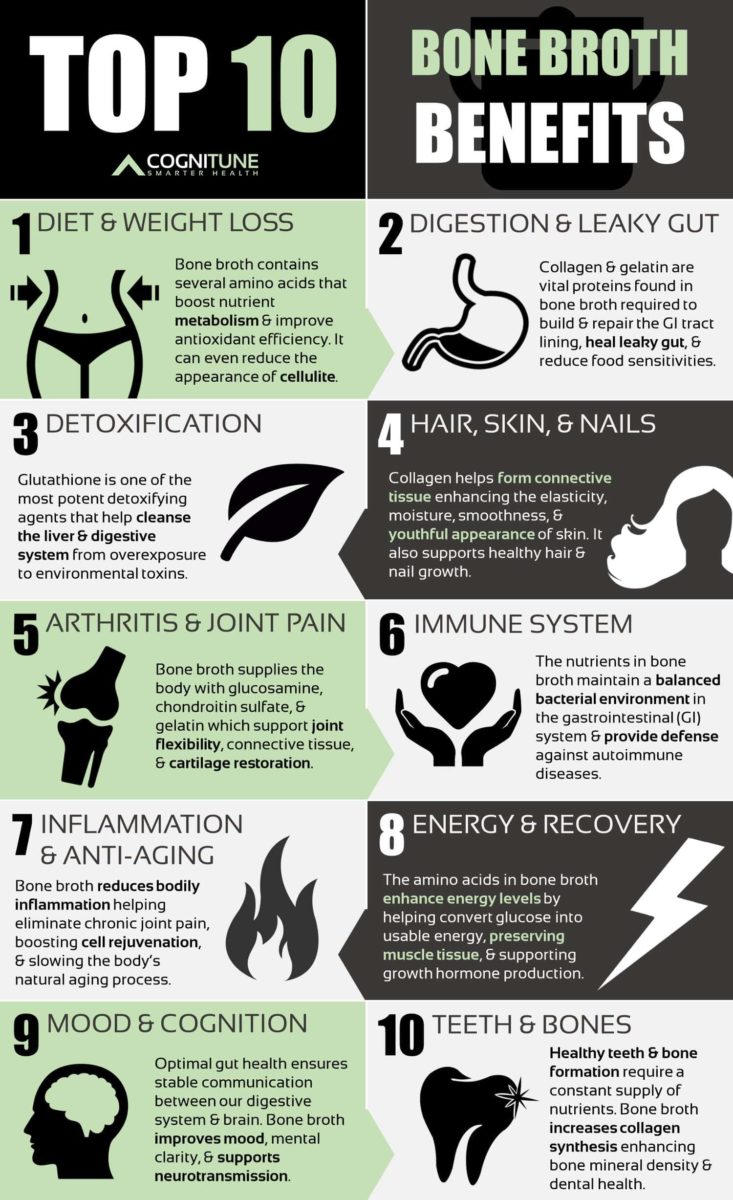Bone Broth Benefits and Nutrition
From Gwyneth Paltrow to Kobe Bryant, many celebs are touting the benefits of bone broth.
Bone Broth Benefits – Nutritionist Vicki Edgson, who recently co-wrote a book entitled Broth, explains the benefits of bone broth:
“Minerals calcium and magnesium, together with the amino acids found in bone broth, are not only essential for bone health, they’re also beneficial for hair and nails,” she says. “Collagen exuded from the bones benefits the intestinal lining by helping to repair the epithelial cells that make up the lining of the gut.”
She says bone broth has anti-inflammatory properties. That helps with eczema, asthma, and other inflammatory conditions.
“Ready-prepared broth can now be found in most major supermarkets,” says Vicki. “Even gyms and fitness centers are now serving broth as a suitable winter alternative to cold juices that may contain antioxidants but do little to replenish a hungry post-workout body before the challenges of the day ahead.”
Bone Broth Benefits
- Improves gut health. Bone broth is easily digested helps to heal the digestive tract and improve nutrient absorption.
- Boosts the immune system. Bone marrow can strengthen the gut which will help to ward off illness and chronic disease.
- Bone broth benefits skin, hair, and nails. Bone marrow contains gelatin (collagen) which is transferred into the bone broth and then into you when you drink it.
- It reduces inflammation. It is also helpful to restrict inflammatory foods (i.e. vegetable oils, sugar, gluten, and GMO foods)
- Inflammation-reducing amino acids are found in bone marrow.
Bone Broth Gelatin and Collagen
A good bone broth congeals when it cools. This is due to the presence of gelatin. This is highly prized by bone broth aficionados. This it means the broth contains a significant amount of collagen (gelatin).
Collagen is helpful in:
- Soft tissue healing.
- Repair of cartilage and bone.
- Healing membranes of the gastrointestinal tract.
- Facilitating digestion and the uptake of proteins.
Collagen and elastin proteins are the building blocks of cartilage. Cartilage contains glycosaminoglycans (GAGs). It also contains chondroitin sulfate, keratin sulfate, and hyaluronic acid (HA). You might recognize chondroitin and hyaluronic acid. They are commonly used supplements for supporting joint and skin health as well as mobility.
Using cartilage-rich beef knuckles, chicken feet, and ribs in bone broth is a cost-effective alternative to pricey supplements.
Cartilage is considered beneficial in the treatment of inflammatory conditions such as:
- Arthritis and degenerative joint disease.
- Inflammatory bowel disease, and lowered immune function.
Selecting the Best Bones for Bone Broth
The most critical factor when making bone broth is the quality of the bones you use. Do your best to source the highest quality bones possible from pasture-raised/free-range animals that are grass fed and have not been subjected to antibiotics, growth hormones, insecticides and herbicides.
Make Your Own Bone Broth
For a nutritious and flavorful recipe, click here.
Purchase Grass Fed Beef Bones
To Purchase Grass Fed Bones for Bone Broth send us a quick email to info@fullsirclefarms.com or call (eight one six) 560 – 1858. They are priced at $5.50 / lb or 4 lbs for $20.00.
Purchase Bare Bones Bone Broth
If you prefer ready made bone broth, consider Bare Bones bone broth. We are an affiliate because they only use bones from animals that were humanely raised on open pastures with clean diets free of antibiotics, hormones and grains. They only use organic vegetables and herbs and their water is filtered, ensuring the final product is as pure, flavorful and packed full of vitamins, minerals and gelatin.

Bone Broth Benefits Infographic
Here’s a great infographic from the folks over at Cognitune.


